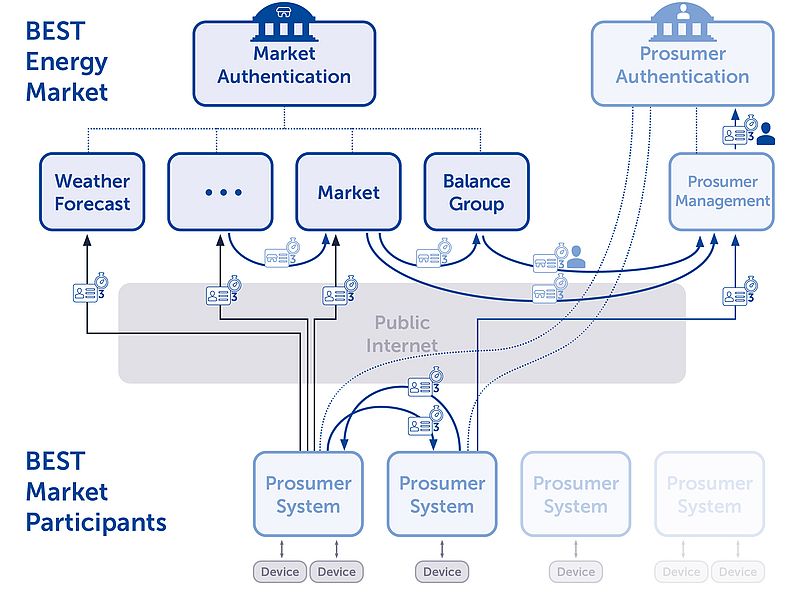The increasing integration of renewable energies into the electricity system is placing growing demands on the grid infrastructure. Volatile electricity generation and a higher proportion of wind and solar energy mean that previous models of electricity grid control are reaching their limits. New, flexible approaches that offer both short-term and long-term incentives are needed to drive forward the integration of renewable energies and increase the efficiency of electricity consumption.
The BEST project (blockchain-based decentralized energy market) has developed an innovative approach to address these issues. A decentralized local electricity market makes it possible to trade electricity freely when the grid infrastructure allows it and to use local flexibility when bottlenecks occur. By using regional flexibility, overloads are to be avoided and the power supply optimized locally. fortiss was responsible for the development of optimized operating strategies, the design of the peer-to-peer (P2P) electricity trading platform and the practical implementation in the laboratory environment.
Field test under real market conditions
Following three years of research work, a test field was created in the Euskirchen area under the leadership of the Reiner Lemoine Institute (RLI) in Berlin together with experts from the Fraunhofer Institute for Open Communication Systems (FOKUS), the digital company OLI Systems, Weserbergland University of Applied Sciences, the energy service provider e-regio and Energieforen Leipzig. There, commercial, municipal and private locations were equipped with the necessary hardware and software. A trading mechanism based on blockchain technology, which takes possible grid bottlenecks into account, was implemented in close cooperation with a regional energy supplier. This allowed the market to be tested under real conditions, which provided important insights.
One of the most important results of the field test was the realization that connecting existing systems to the IT infrastructure represents a major hurdle. The high personnel and cost expenditure for the integration of heterogeneous existing systems makes it clear that standardized measurement concepts and an improved connection to energy management systems are required in order to fully exploit the flexibility potential of small and medium-sized companies in particular.
Another point is the increased grid load caused by the simultaneous transmission of electricity price signals, particularly in view of the increasing electrification of the mobility and heating sectors. New regulations, such as those proposed in Section 14a of the Energy Industry Act (EnWG), could provide a remedy here, provided they are defined more precisely in terms of space and time. At the same time, the potential of local electricity markets, which offer a transparent and scalable solution to efficiently manage local electricity supply and demand, is becoming apparent.
Private households and SMEs benefit from local solutions
Local electricity markets enable households and companies to use their systems flexibly in order to reduce costs in a targeted manner without affecting their operational processes. Private households and small and medium-sized enterprises (SMEs) in particular benefit from this opportunity to reduce their electricity costs. However, the test also made it clear that the widespread use of intelligent metering systems (smart meters) is a crucial prerequisite for the success of local electricity trading.
The results of the BEST project show that local electricity trading is a promising solution for overcoming the challenges posed by the increasing share of renewable energies. Nevertheless, additional technical and regulatory adjustments are required to enable the integration of broader market segments and further increase scalability.



